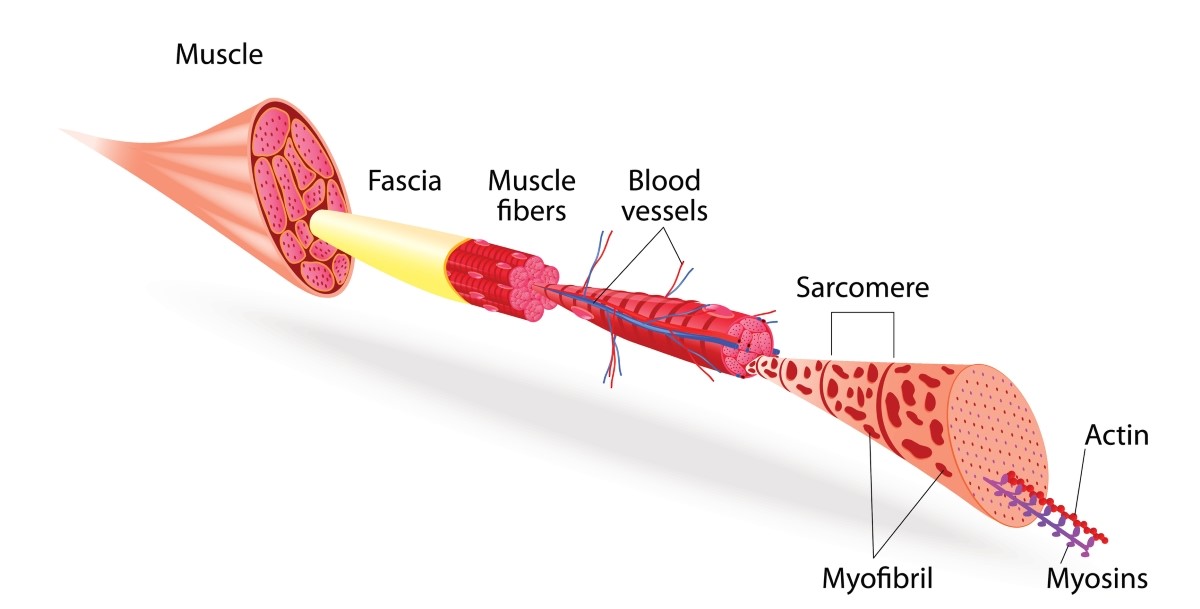Muscle discovery, aging and memory, plus other stories

Muscle discovery may lead to better drugs
The smallest constituents of muscles, myosin and actin, may be targeted to contribute to more effective treatment methods against heart and muscle diseases, say a group of international researchers at McGill University and Linnaeus University.
The question of what happens at the molecular level inside our muscles when they are activated has long eluded researchers. In muscles, there are billions of small proteins called myosin and actin. Individually, their size is only one hundred thousandth of a millimeter but these microscopic units create kinetic energy by converting cell fuel into, among other things, phosphate. But exactly how this is done has long been a mystery until now.
“We have mapped how phosphate, the substance that forms when muscles are activated, behaves when it is released from the myosin during muscle contractions,” says Dilson Rassier, Dean of Faculty of Education and lead author of the study. “The phosphate moves in a different way than previously thought and makes several 'breaks' in and on the myosin.”
“Our results are of great potential importance for treating serious diseases in which myosin plays a central role. This applies to serious diseases of the heart and body muscles, to the spread of cancer cells to new tumors and the invasion of human red blood cells by malaria parasites,” says study co-author Alf Månsson, a professor of physiology at Linnaeus University.
"Multistep orthophosphate release tunes actomyosin energy transduction” by Luisa Moretto et al. was published in Nature Communications.

Faster cognitive decline in older adults with low muscle mass?
For the first time, McGill University researchers have found a significant association between the presence of low muscle mass and faster cognitive decline, and that this association is independent of muscle strength and physical activity level. These findings could be used to help identify people at risk of developing dementia, according to the researchers.
The research is based on the study of a cohort of 30,000 Canadians between the ages of 65-86 years old. Researchers from the McGill School of Human Nutrition and the Metabolic Disorders and Complications Program (MeDiC) at the Research Institute of the McGill University Health Centre (RI-MUHC) has shown for the first time that the presence of lower muscle mass is associated with faster cognitive decline in older adults.
“These findings are important because muscle mass is a modifiable factor, meaning that we can do something about it. Exercise ─ particularly resistance exercise ─ and good nutrition with sufficient protein can help maintain muscle mass over the years,” says Stéphanie Chevalier, who led the study. “Our results show that measuring low muscle mass may help to identify people who have greater risk of cognitive decline. We should measure muscle more widely, in clinics, not only in research studies.”
"Association of Low Muscle Mass With Cognitive Function During a 3-Year Follow-up Among Adults Aged 65 to 86 Years in the Canadian Longitudinal Study on Aging" by Anne-Julie Tessier et al., was published in JAMA Network Open.

A step closer to understanding the impact of aging on memory in older adults
Aging is often associated with memory decline in healthy adults at midlife and advanced age. However, it is not age itself that contributes to worsening memory, but rather the effects of age on the volume of the hippocampus, a major brain component that helps consolidate information from short-term memory to long-term memory, that likely impacts memory performance.
A team of McGill researchers are looking at how certain brain structures change across the lifespan and how this influences memory function. Understanding how normative aging affects brain structure, function, and cognition, is critical for establishing a ground truth or baseline which can be used to help identify early signs of pathological aging associated with diseases such as Alzheimer’s Disease and Parkinson’s.
The team worked with a sample of 125 healthy adults aged 19–76 years old who were asked to perform memory tasks. The researchers found that the ability to remember detailed face-location associations was related to having larger volumes in the posterior hippocampal and medial temporal system, and normative aging was associated with reduced volumes in these brain regions and related deficits in memory function.
They also found that age-related volume reductions in the posterior hippocampus correlated with reduced activity in brain networks important for perception, memory, and cognitive control. The results highlight how memory is dependent on the interaction of multiple brain networks, and how normative aging affects these brain systems and cognition.
“We were surprised that our results were so specific and clear cut. This is rare in neuroscience and speaks to the robustness of the methods and results”, says Maria Natasha Rajah, a professor in the Department of Psychiatry and senior author of the study.
Researchers across the globe have long been trying to understand differences in normative and pathological aging in order to best identify indicators of age-related neurodegenerative disorders. “We hope our work will help improve understanding of memory and brain deficits in aging and dementias,” Rajah added.
“Volume of the posterior hippocampus mediates age-related differences in spatial context memory and is correlated with increased activity in lateral frontal, parietal and occipital regions in healthy aging” by Jamie Snytte et al. was published in NeuroImage.
About McGill University
Founded in Montreal, Quebec, in 1821, McGill University is Canada’s top ranked medical doctoral university. McGill is consistently ranked as one of the top universities, both nationally and internationally. It is a world-renowned institution of higher learning with research activities spanning three campuses, 11 faculties, 13 professional schools, 300 programs of study and over 39,000 students, including more than 10,400 graduate students. McGill attracts students from over 150 countries around the world, its 12,000 international students making up 30% of the student body. Over half of McGill students claim a first language other than English, including approximately 20% of our students who say French is their mother tongue.

